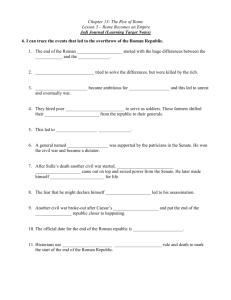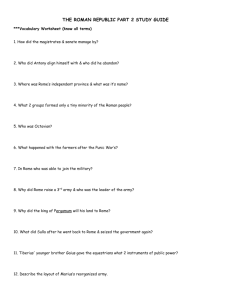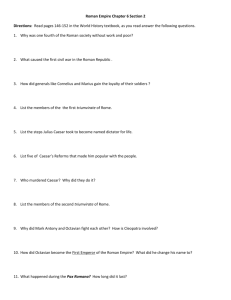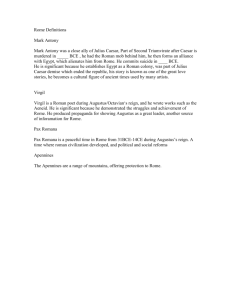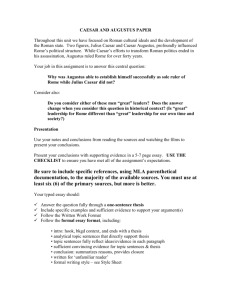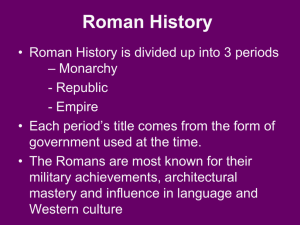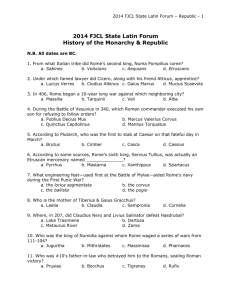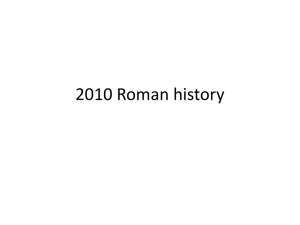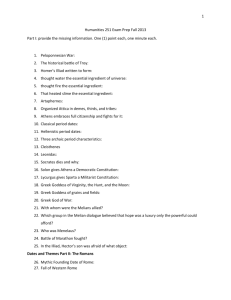Outline of Roman History
advertisement
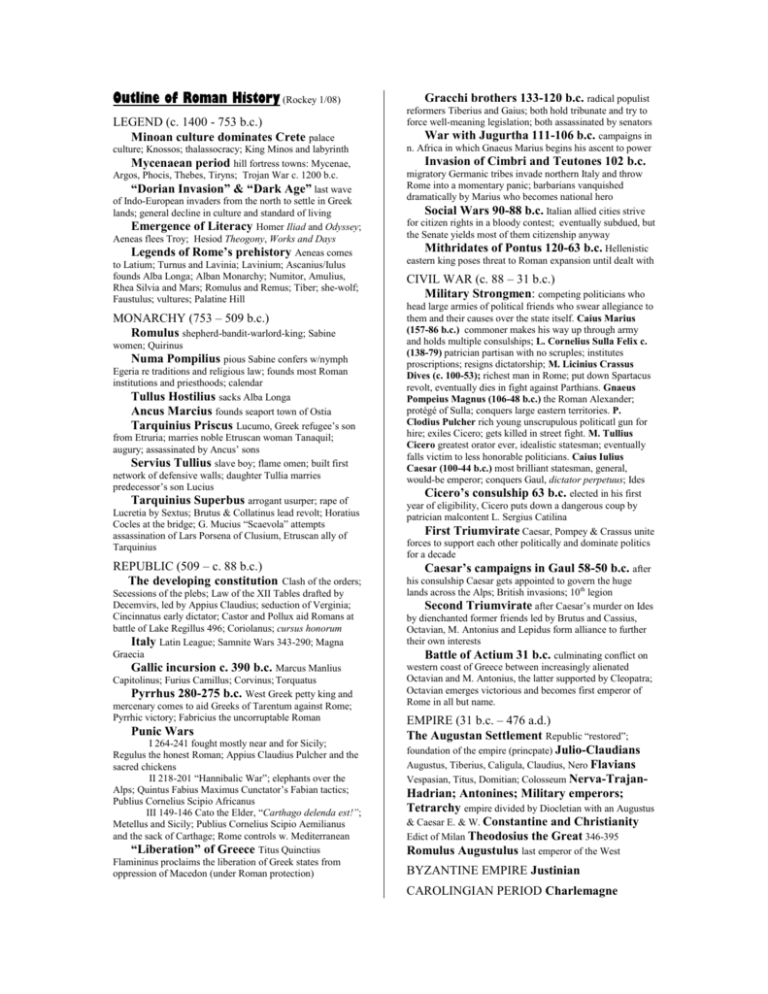
Outline of Roman History (Rockey 1/08) LEGEND (c. 1400 - 753 b.c.) Minoan culture dominates Crete palace culture; Knossos; thalassocracy; King Minos and labyrinth Mycenaean period hill fortress towns: Mycenae, Argos, Phocis, Thebes, Tiryns; Trojan War c. 1200 b.c. “Dorian Invasion” & “Dark Age” last wave of Indo-European invaders from the north to settle in Greek lands; general decline in culture and standard of living Emergence of Literacy Homer Iliad and Odyssey; Aeneas flees Troy; Hesiod Theogony, Works and Days Legends of Rome’s prehistory Aeneas comes to Latium; Turnus and Lavinia; Lavinium; Ascanius/Iulus founds Alba Longa; Alban Monarchy; Numitor, Amulius, Rhea Silvia and Mars; Romulus and Remus; Tiber; she-wolf; Faustulus; vultures; Palatine Hill MONARCHY (753 – 509 b.c.) Romulus shepherd-bandit-warlord-king; Sabine women; Quirinus Numa Pompilius pious Sabine confers w/nymph Egeria re traditions and religious law; founds most Roman institutions and priesthoods; calendar Tullus Hostilius sacks Alba Longa Ancus Marcius founds seaport town of Ostia Tarquinius Priscus Lucumo, Greek refugee’s son from Etruria; marries noble Etruscan woman Tanaquil; augury; assassinated by Ancus’ sons Servius Tullius slave boy; flame omen; built first network of defensive walls; daughter Tullia marries predecessor’s son Lucius Tarquinius Superbus arrogant usurper; rape of Lucretia by Sextus; Brutus & Collatinus lead revolt; Horatius Cocles at the bridge; G. Mucius “Scaevola” attempts assassination of Lars Porsena of Clusium, Etruscan ally of Tarquinius REPUBLIC (509 – c. 88 b.c.) The developing constitution Clash of the orders; Secessions of the plebs; Law of the XII Tables drafted by Decemvirs, led by Appius Claudius; seduction of Verginia; Cincinnatus early dictator; Castor and Pollux aid Romans at battle of Lake Regillus 496; Coriolanus; cursus honorum Italy Latin League; Samnite Wars 343-290; Magna Graecia Gallic incursion c. 390 b.c. Marcus Manlius Capitolinus; Furius Camillus; Corvinus; Torquatus Pyrrhus 280-275 b.c. West Greek petty king and mercenary comes to aid Greeks of Tarentum against Rome; Pyrrhic victory; Fabricius the uncorruptable Roman Punic Wars I 264-241 fought mostly near and for Sicily; Regulus the honest Roman; Appius Claudius Pulcher and the sacred chickens II 218-201 “Hannibalic War”; elephants over the Alps; Quintus Fabius Maximus Cunctator’s Fabian tactics; Publius Cornelius Scipio Africanus III 149-146 Cato the Elder, “Carthago delenda est!”; Metellus and Sicily; Publius Cornelius Scipio Aemilianus and the sack of Carthage; Rome controls w. Mediterranean “Liberation” of Greece Titus Quinctius Flamininus proclaims the liberation of Greek states from oppression of Macedon (under Roman protection) Gracchi brothers 133-120 b.c. radical populist reformers Tiberius and Gaius; both hold tribunate and try to force well-meaning legislation; both assassinated by senators War with Jugurtha 111-106 b.c. campaigns in n. Africa in which Gnaeus Marius begins his ascent to power Invasion of Cimbri and Teutones 102 b.c. migratory Germanic tribes invade northern Italy and throw Rome into a momentary panic; barbarians vanquished dramatically by Marius who becomes national hero Social Wars 90-88 b.c. Italian allied cities strive for citizen rights in a bloody contest; eventually subdued, but the Senate yields most of them citizenship anyway Mithridates of Pontus 120-63 b.c. Hellenistic eastern king poses threat to Roman expansion until dealt with CIVIL WAR (c. 88 – 31 b.c.) Military Strongmen: competing politicians who head large armies of political friends who swear allegiance to them and their causes over the state itself. Caius Marius (157-86 b.c.) commoner makes his way up through army and holds multiple consulships; L. Cornelius Sulla Felix c. (138-79) patrician partisan with no scruples; institutes proscriptions; resigns dictatorship; M. Licinius Crassus Dives (c. 100-53); richest man in Rome; put down Spartacus revolt, eventually dies in fight against Parthians. Gnaeus Pompeius Magnus (106-48 b.c.) the Roman Alexander; protégé of Sulla; conquers large eastern territories. P. Clodius Pulcher rich young unscrupulous politicatl gun for hire; exiles Cicero; gets killed in street fight. M. Tullius Cicero greatest orator ever, idealistic statesman; eventually falls victim to less honorable politicians. Caius Iulius Caesar (100-44 b.c.) most brilliant statesman, general, would-be emperor; conquers Gaul, dictator perpetuus; Ides Cicero’s consulship 63 b.c. elected in his first year of eligibility, Cicero puts down a dangerous coup by patrician malcontent L. Sergius Catilina First Triumvirate Caesar, Pompey & Crassus unite forces to support each other politically and dominate politics for a decade Caesar’s campaigns in Gaul 58-50 b.c. after his consulship Caesar gets appointed to govern the huge lands across the Alps; British invasions; 10th legion Second Triumvirate after Caesar’s murder on Ides by dienchanted former friends led by Brutus and Cassius, Octavian, M. Antonius and Lepidus form alliance to further their own interests Battle of Actium 31 b.c. culminating conflict on western coast of Greece between increasingly alienated Octavian and M. Antonius, the latter supported by Cleopatra; Octavian emerges victorious and becomes first emperor of Rome in all but name. EMPIRE (31 b.c. – 476 a.d.) The Augustan Settlement Republic “restored”; foundation of the empire (princpate) Julio-Claudians Augustus, Tiberius, Caligula, Claudius, Nero Flavians Vespasian, Titus, Domitian; Colosseum Nerva-TrajanHadrian; Antonines; Military emperors; Tetrarchy empire divided by Diocletian with an Augustus & Caesar E. & W. Constantine and Christianity Edict of Milan Theodosius the Great 346-395 Romulus Augustulus last emperor of the West BYZANTINE EMPIRE Justinian CAROLINGIAN PERIOD Charlemagne
